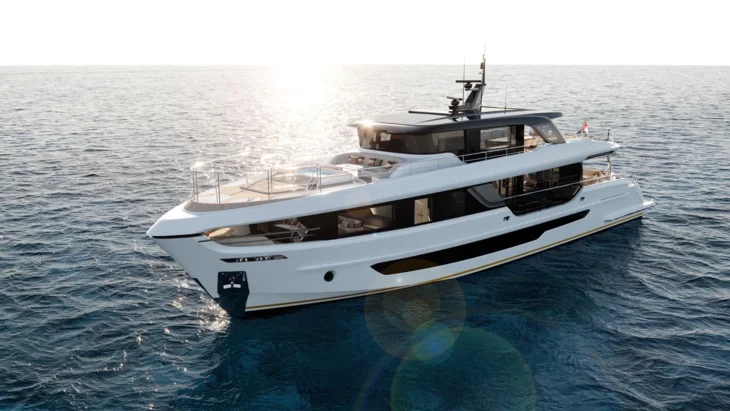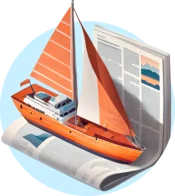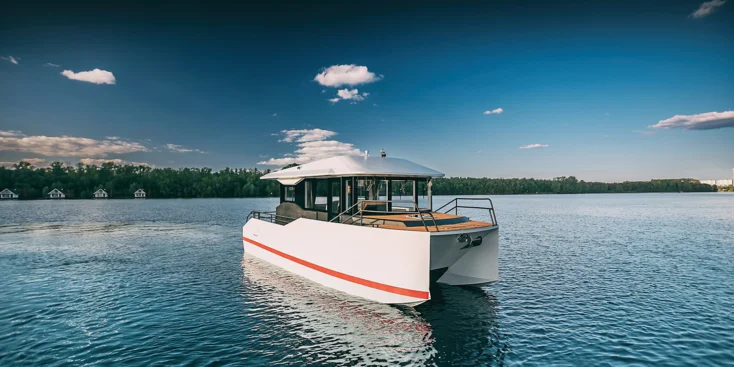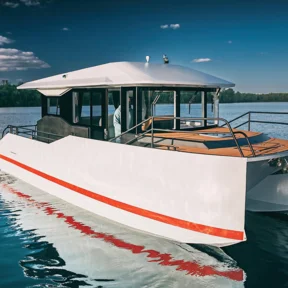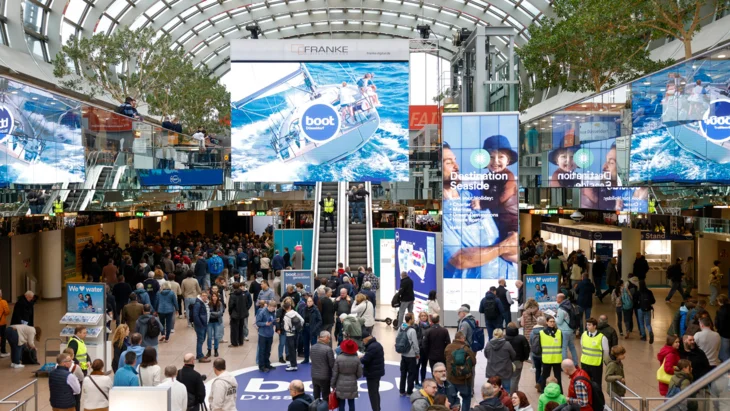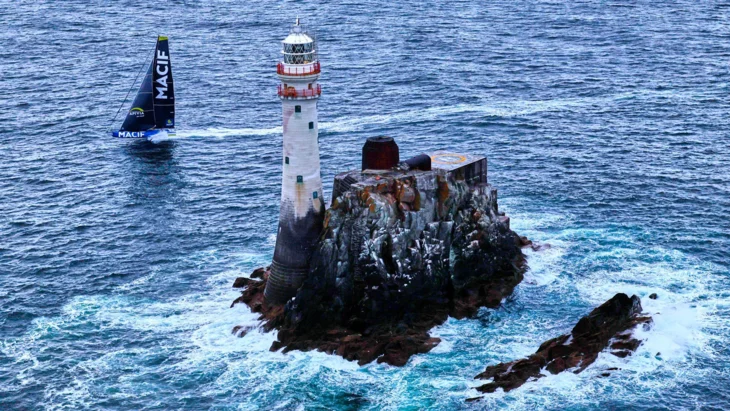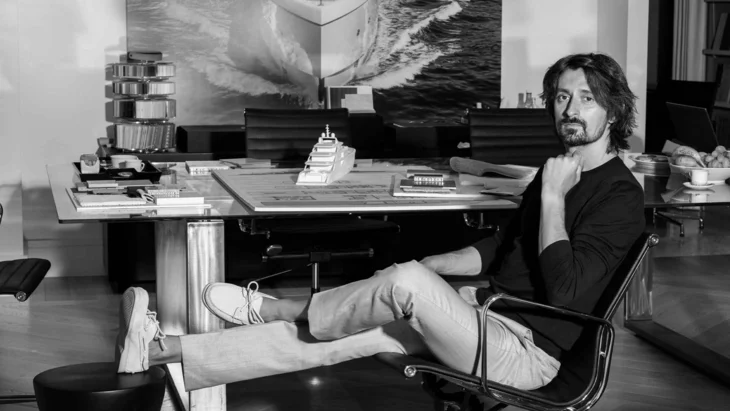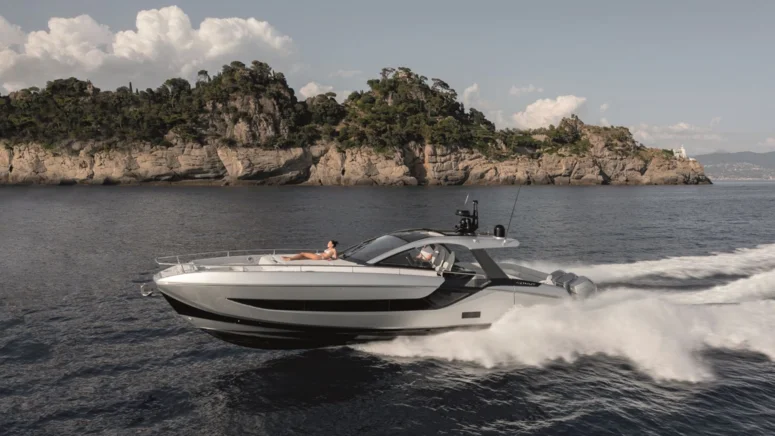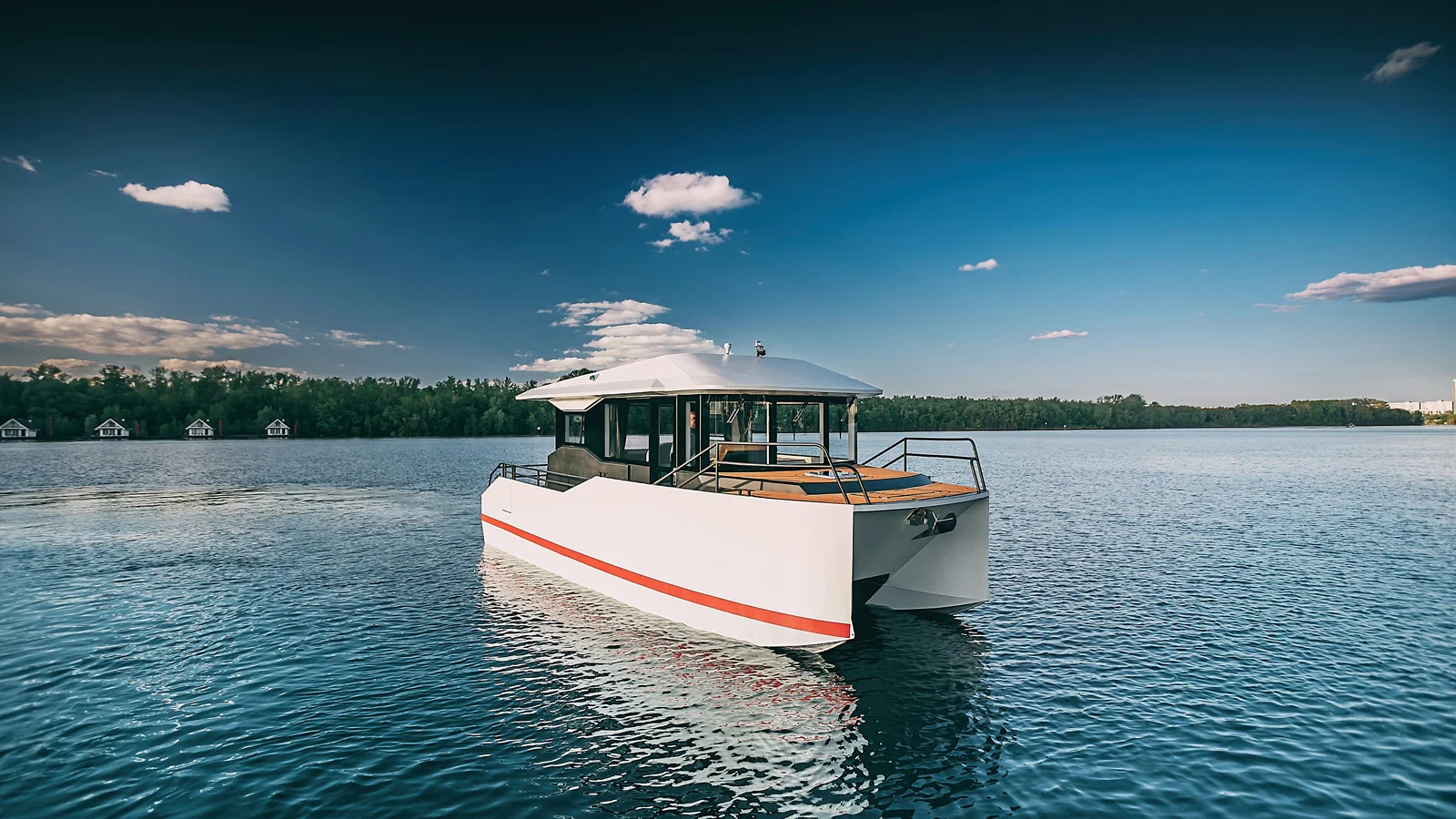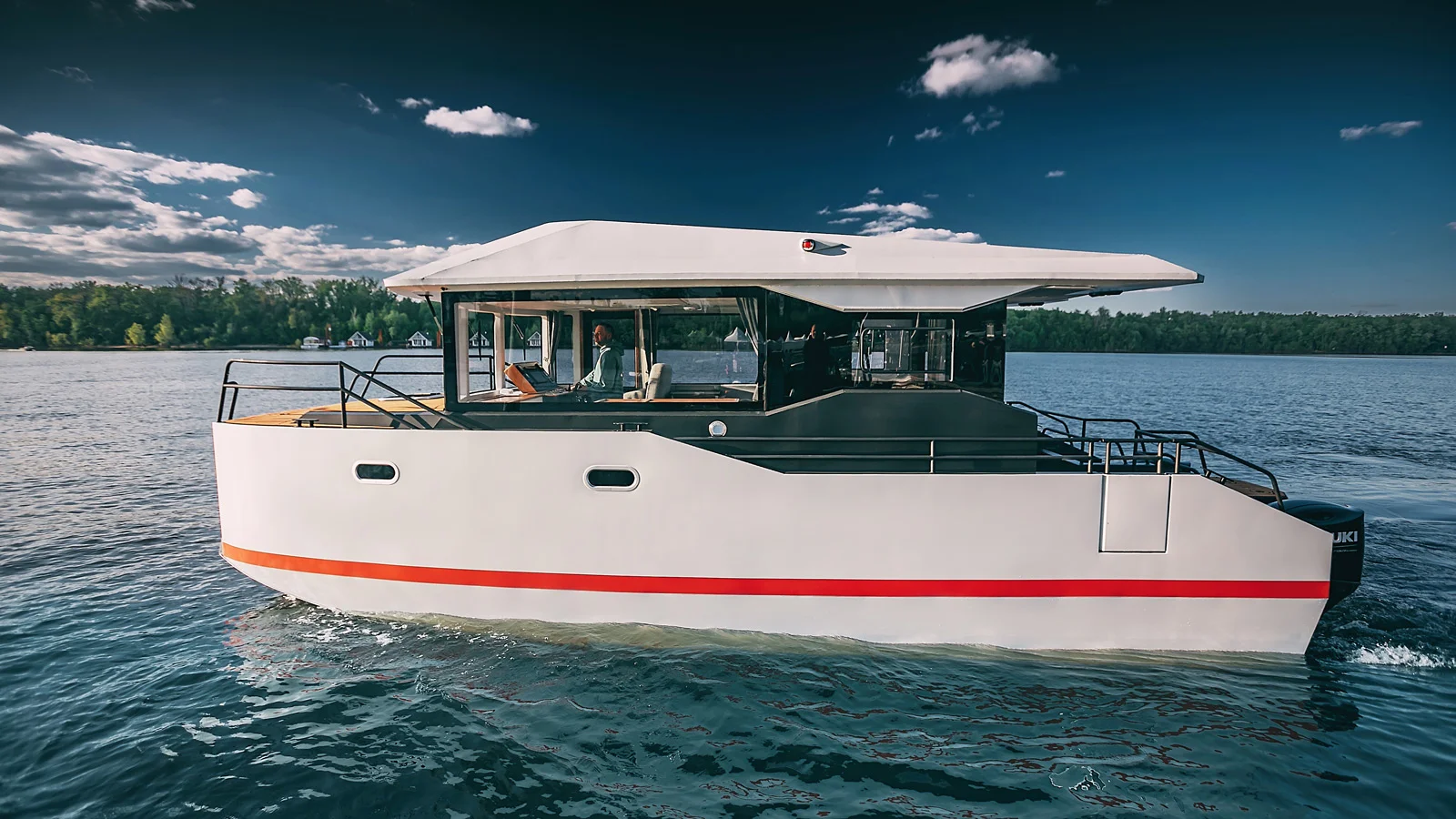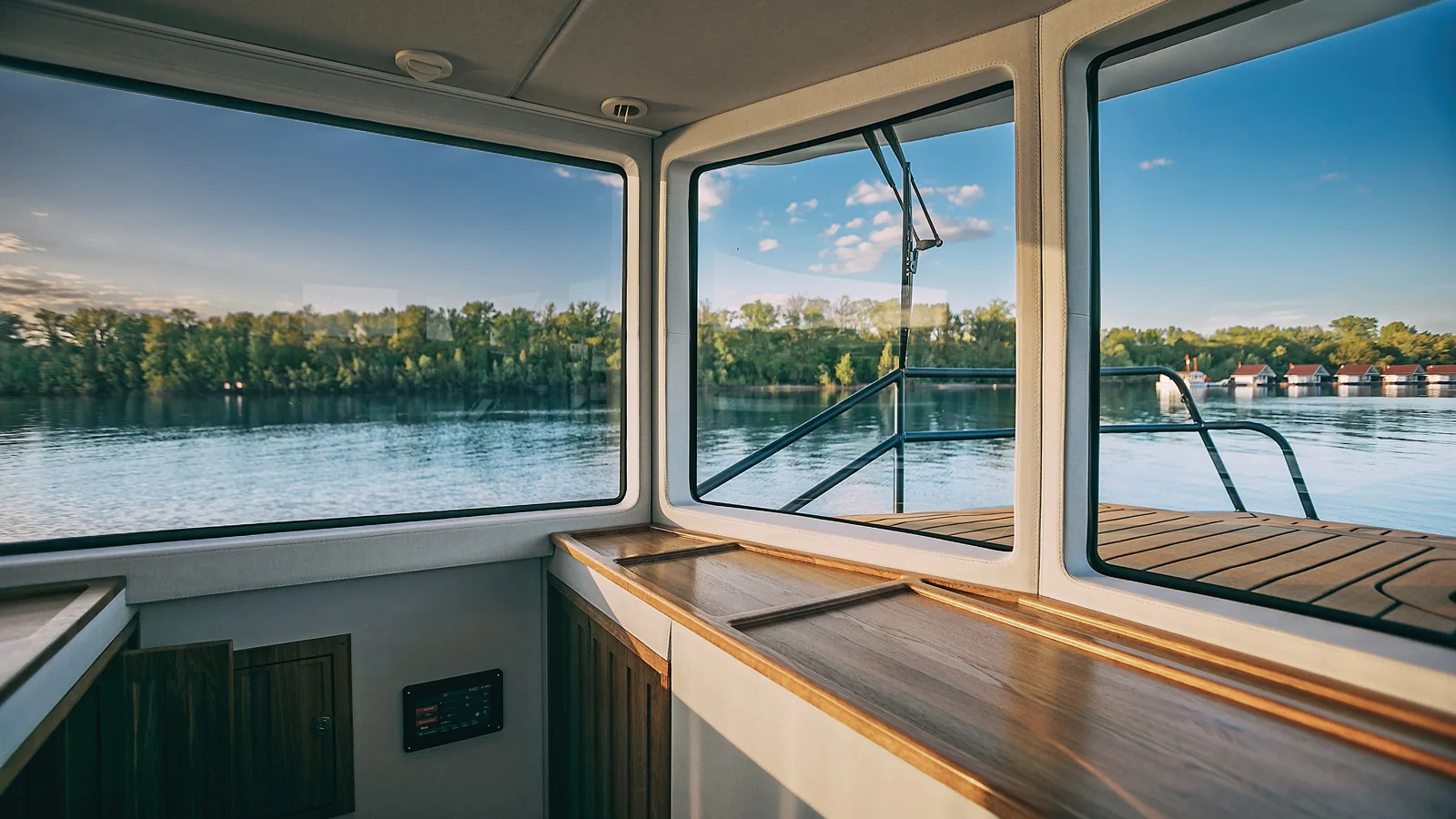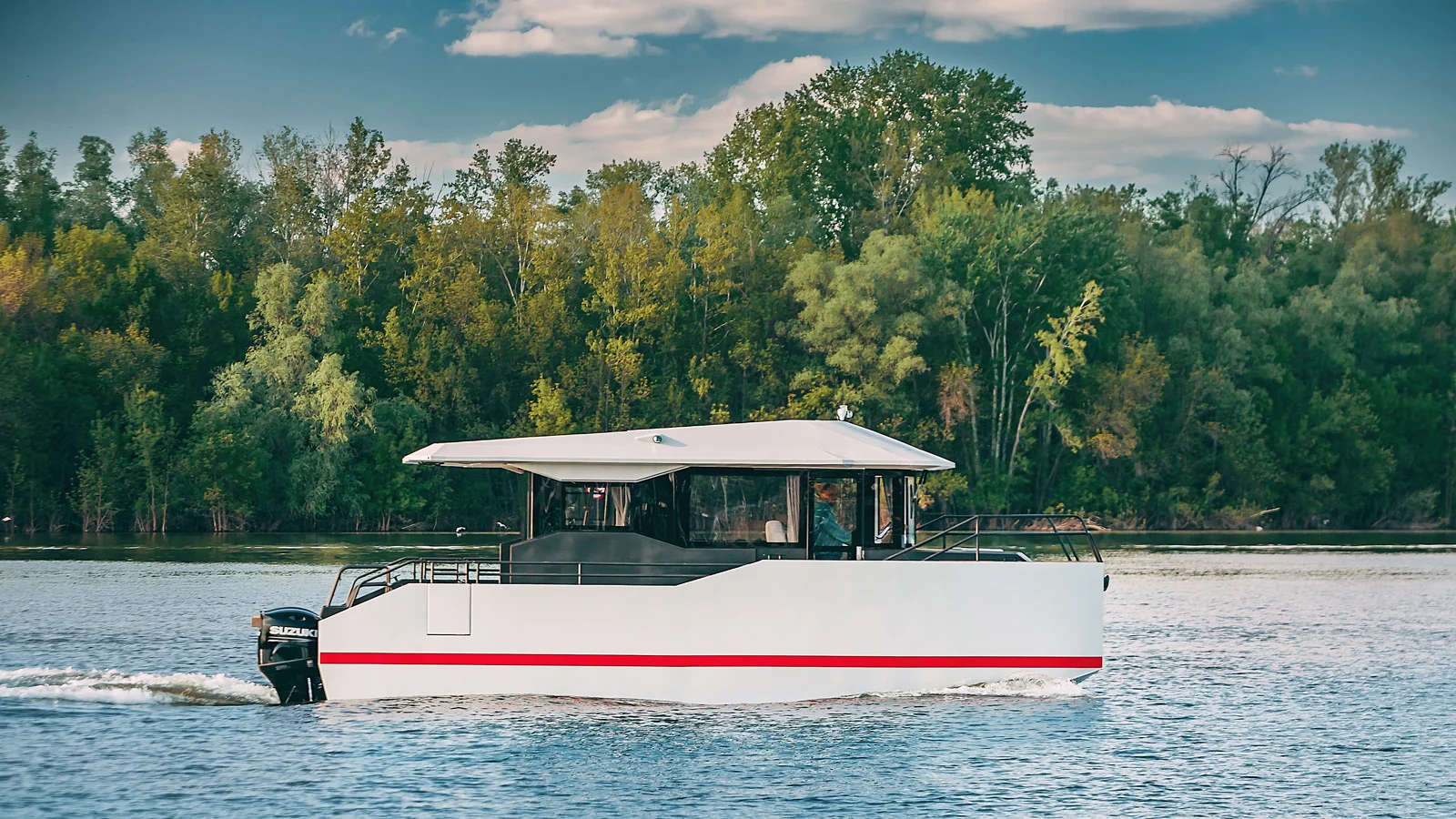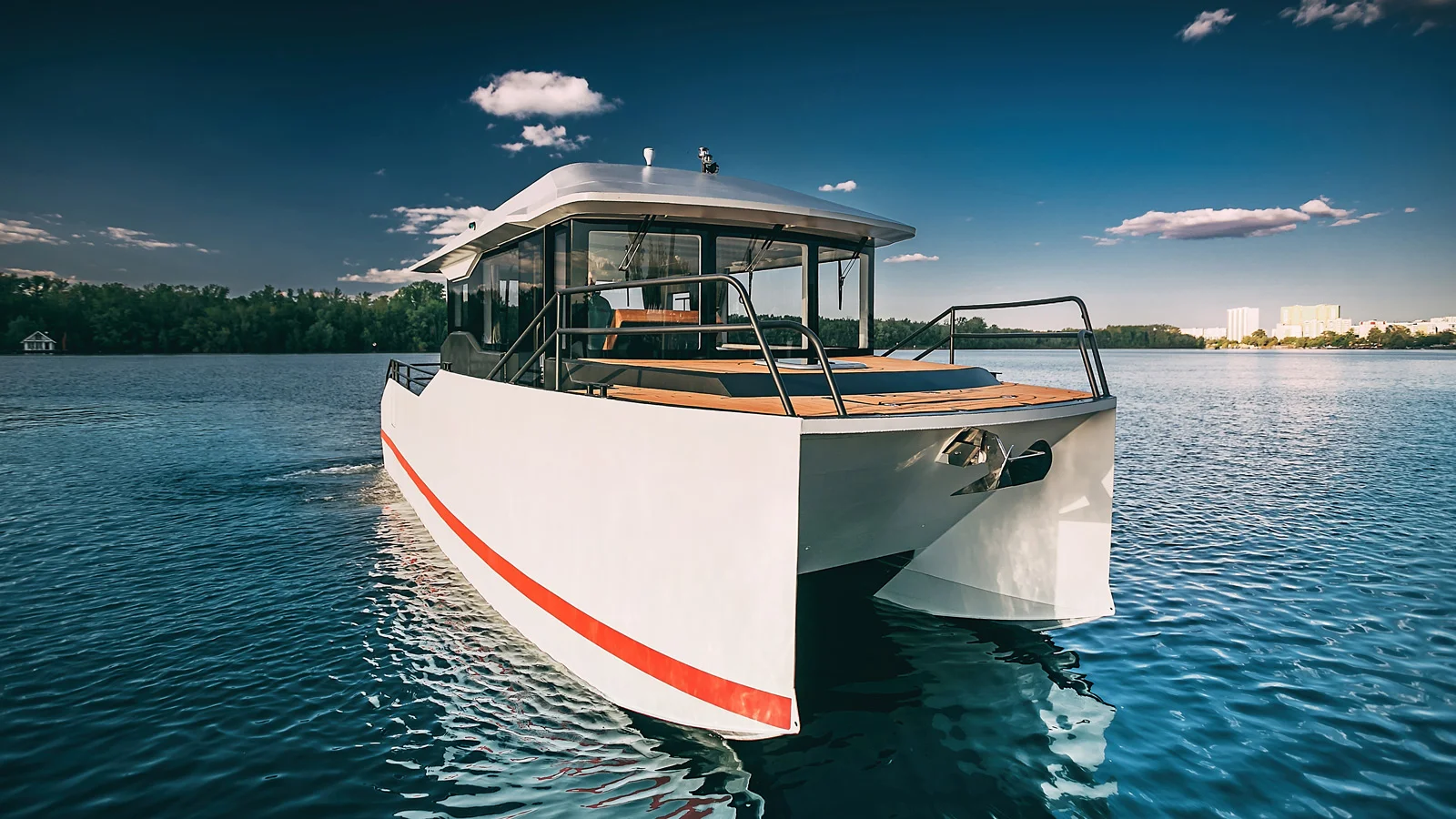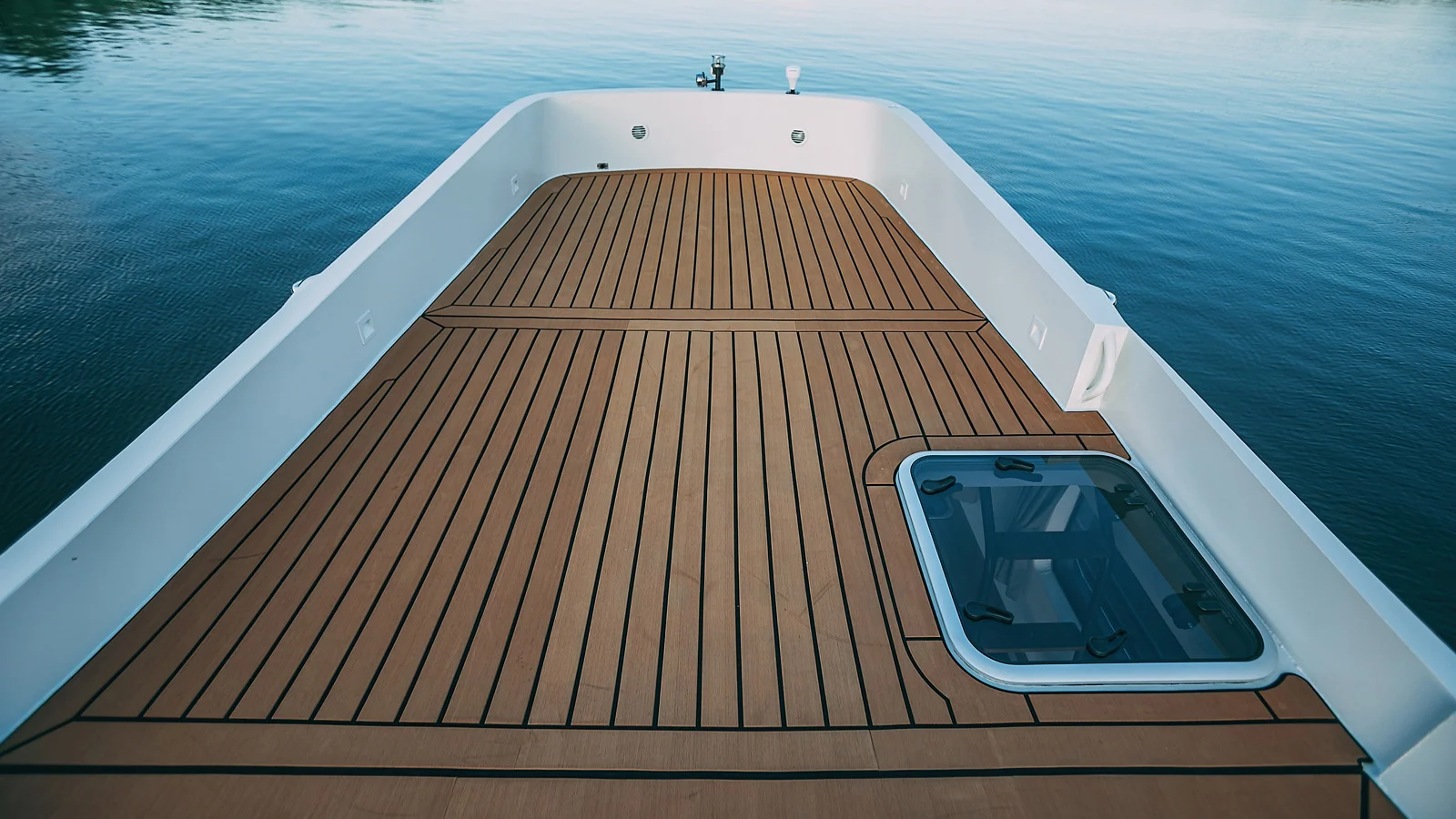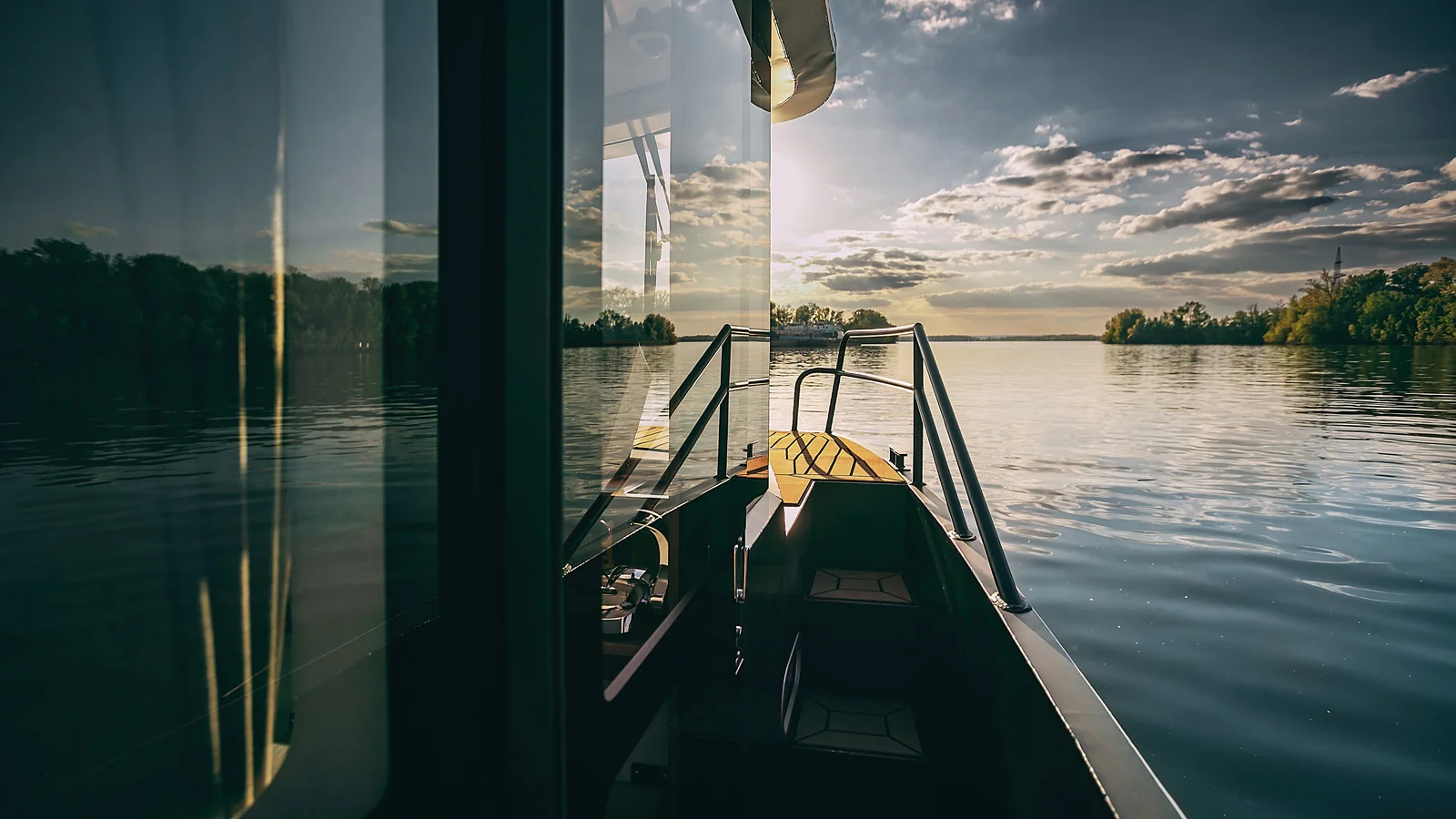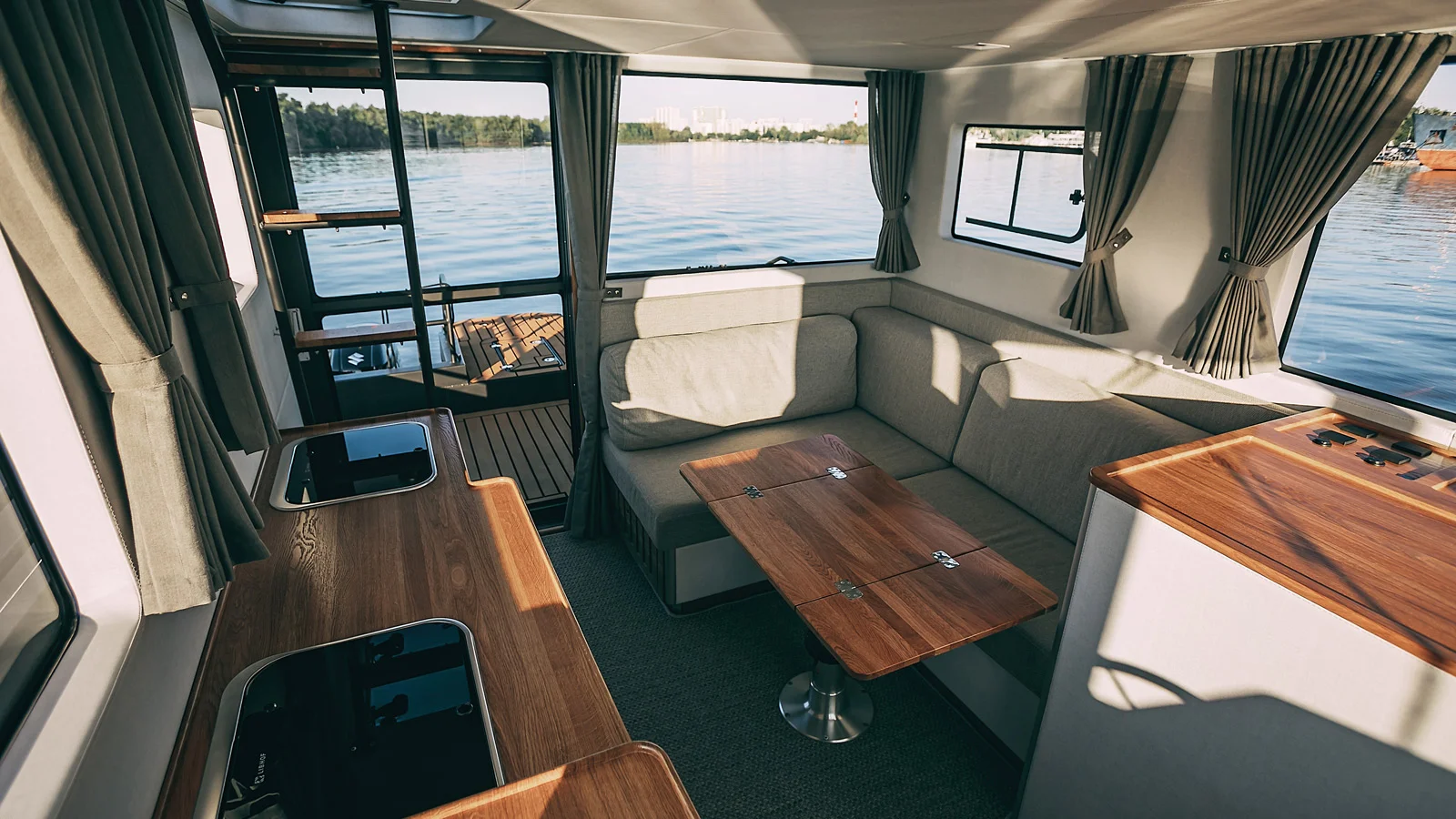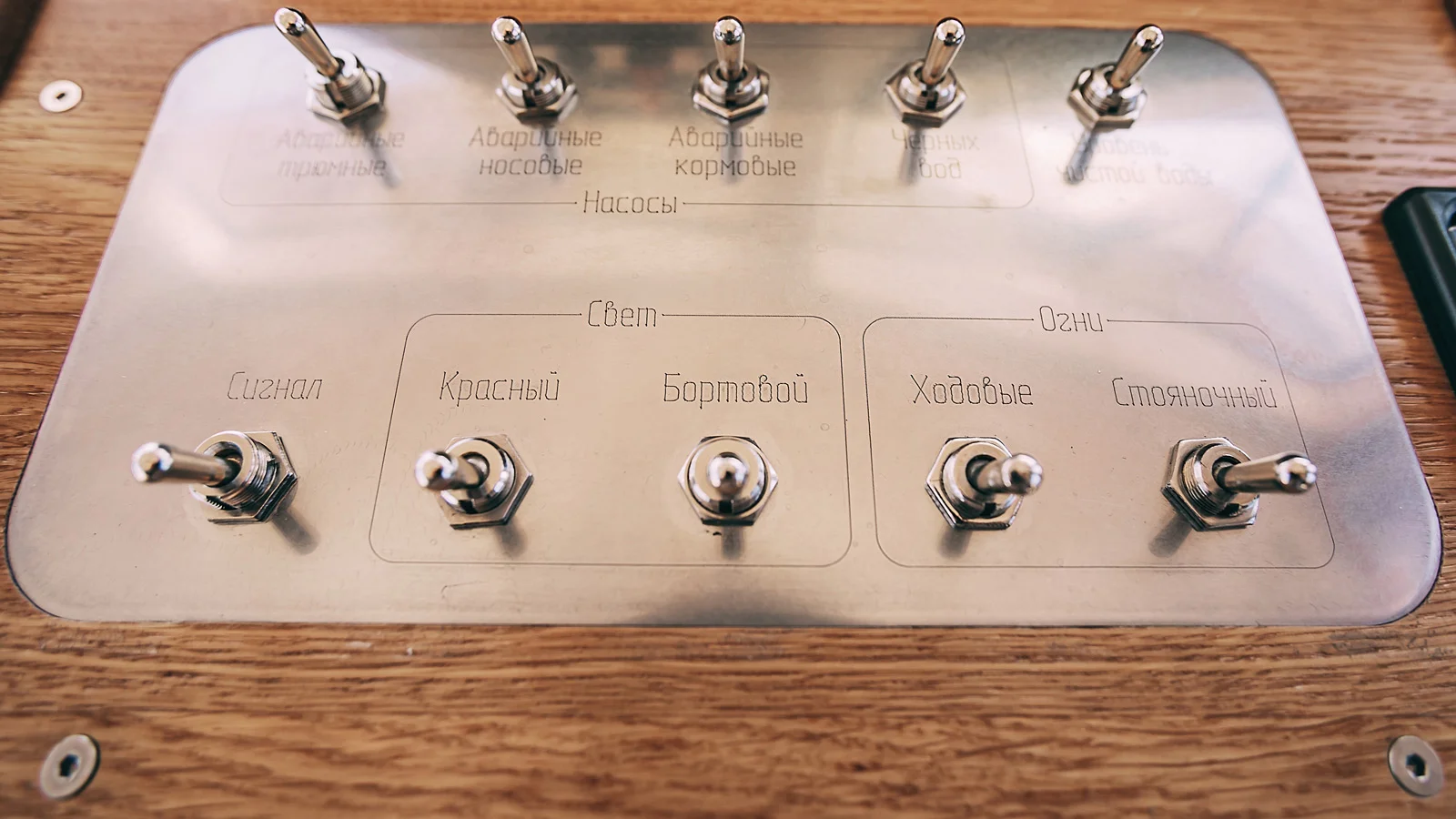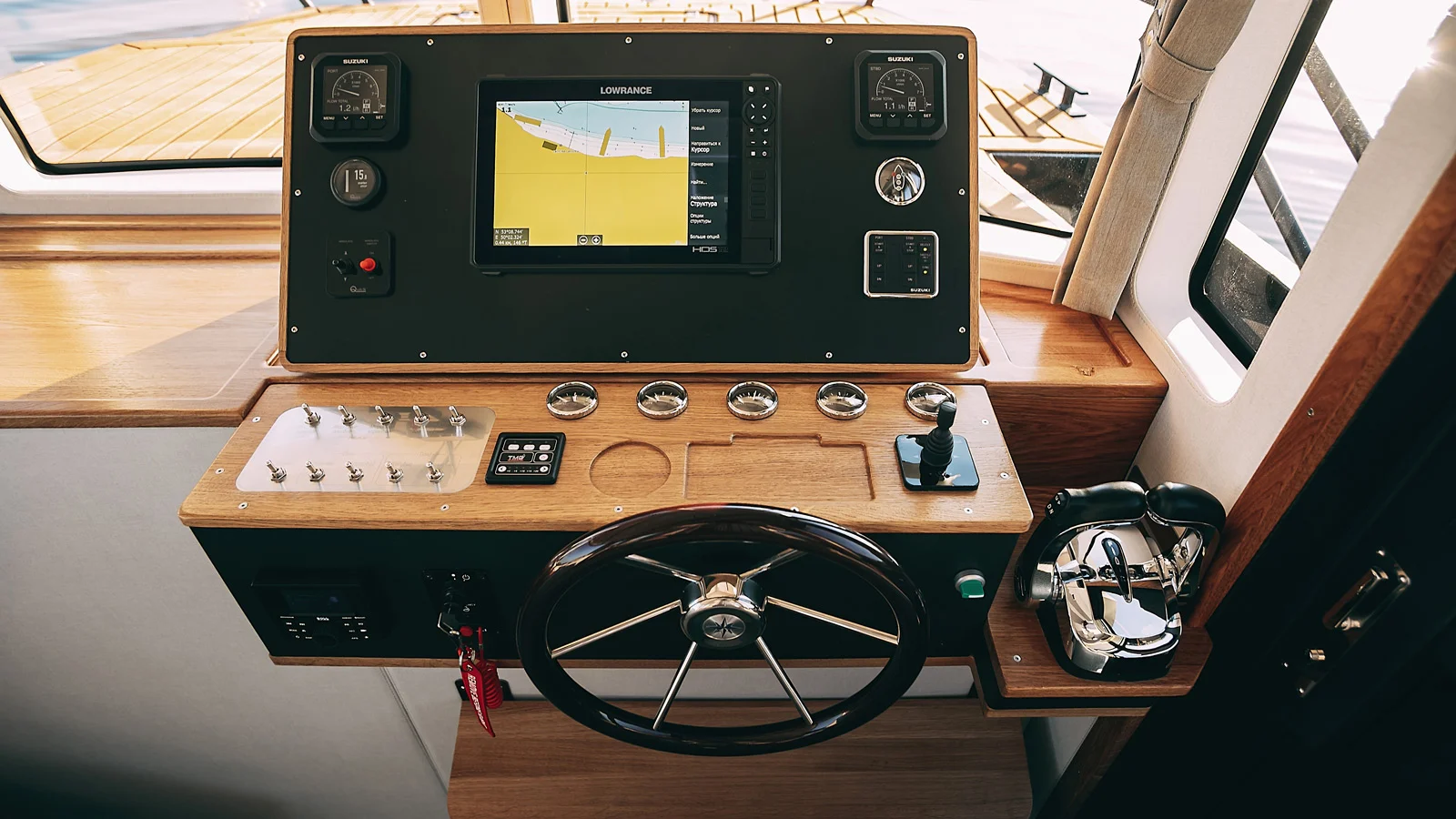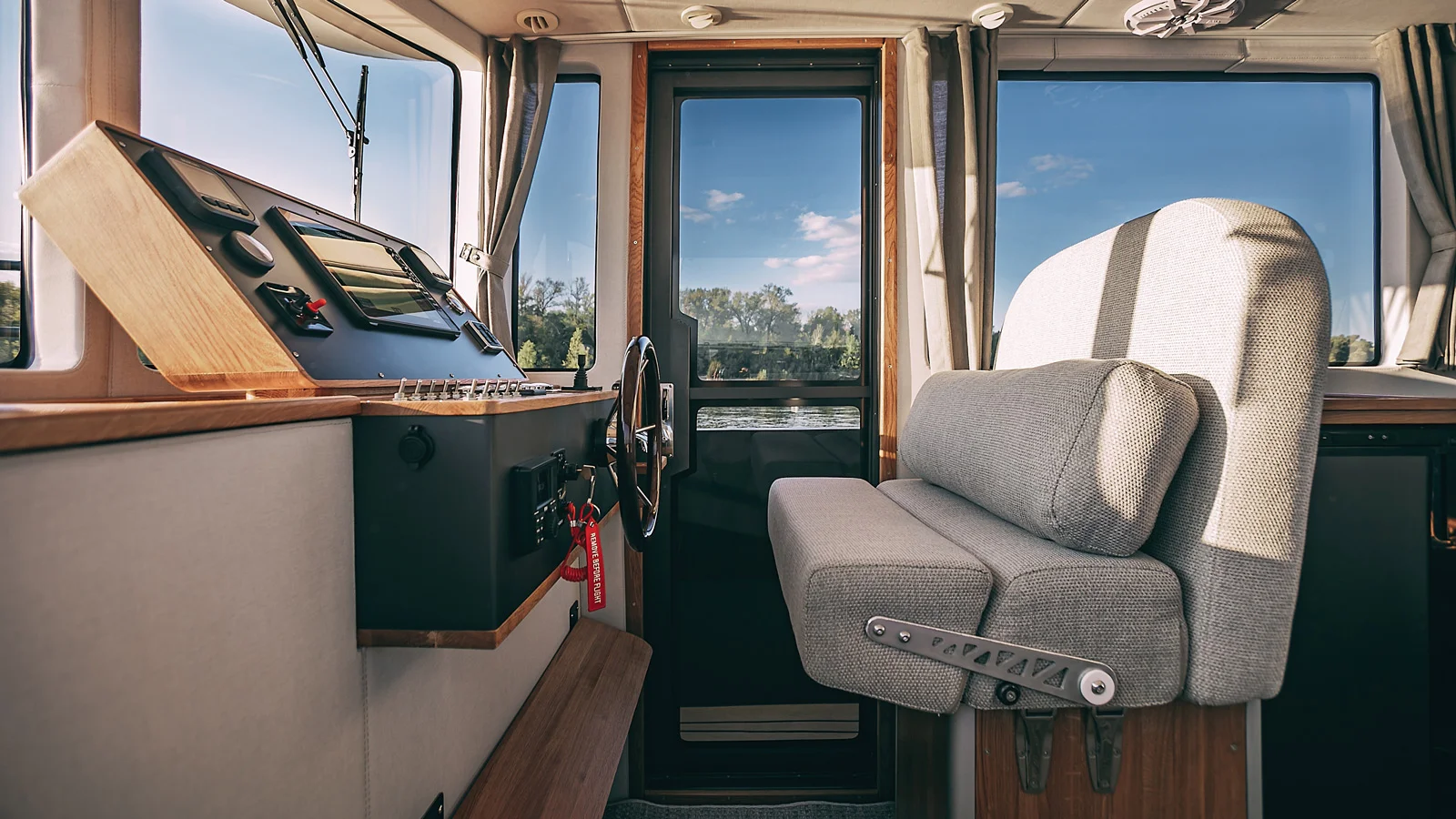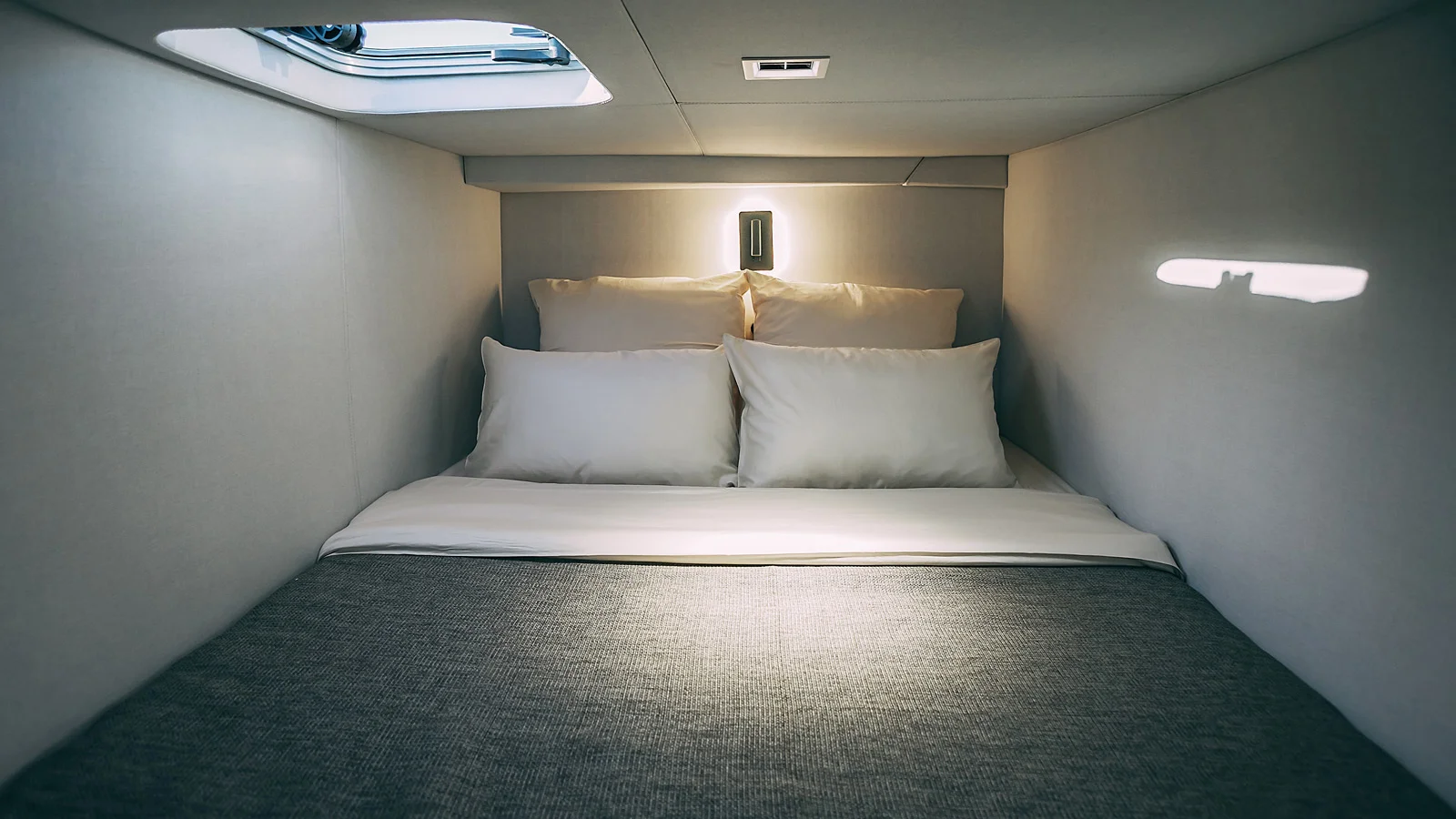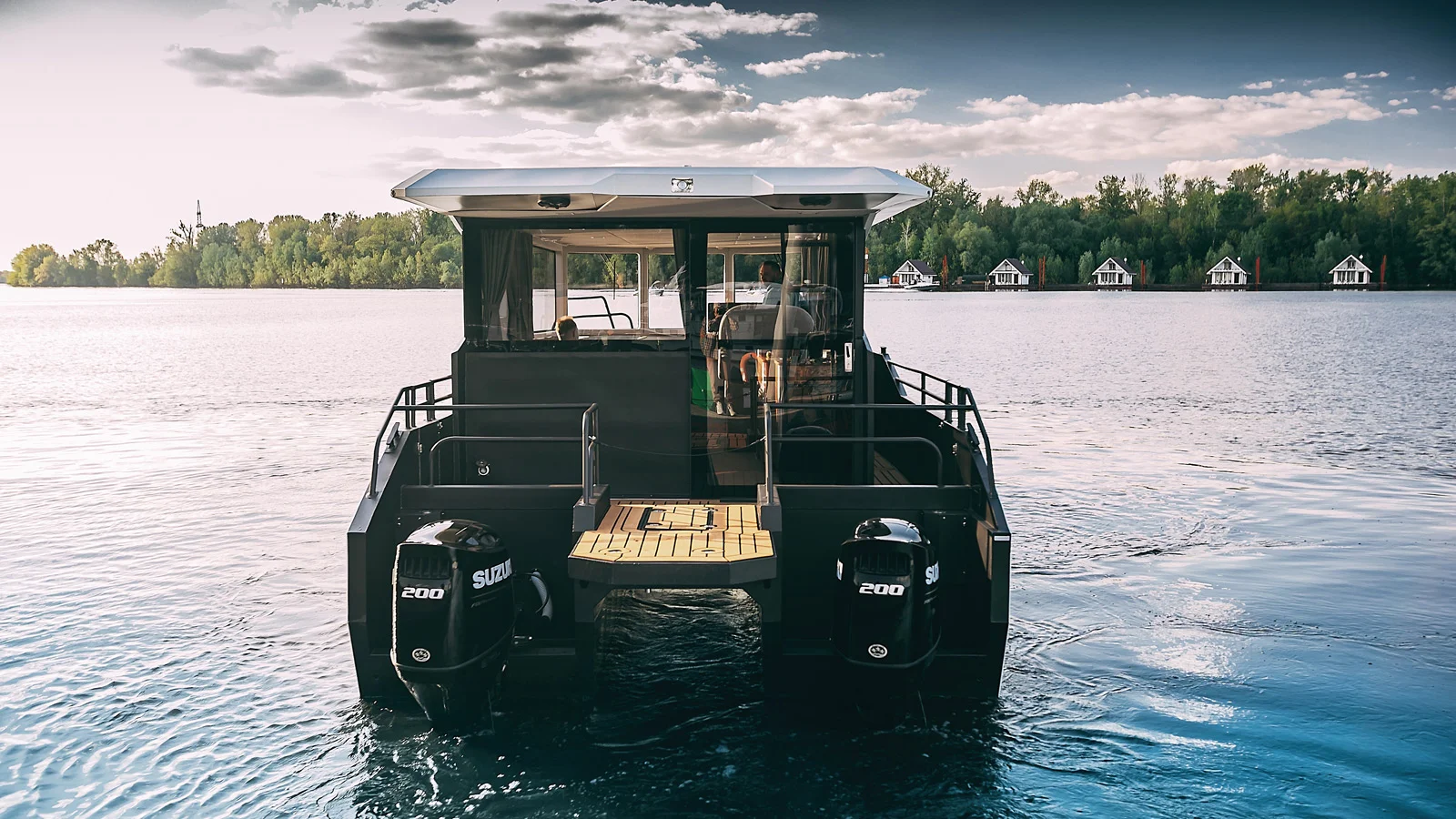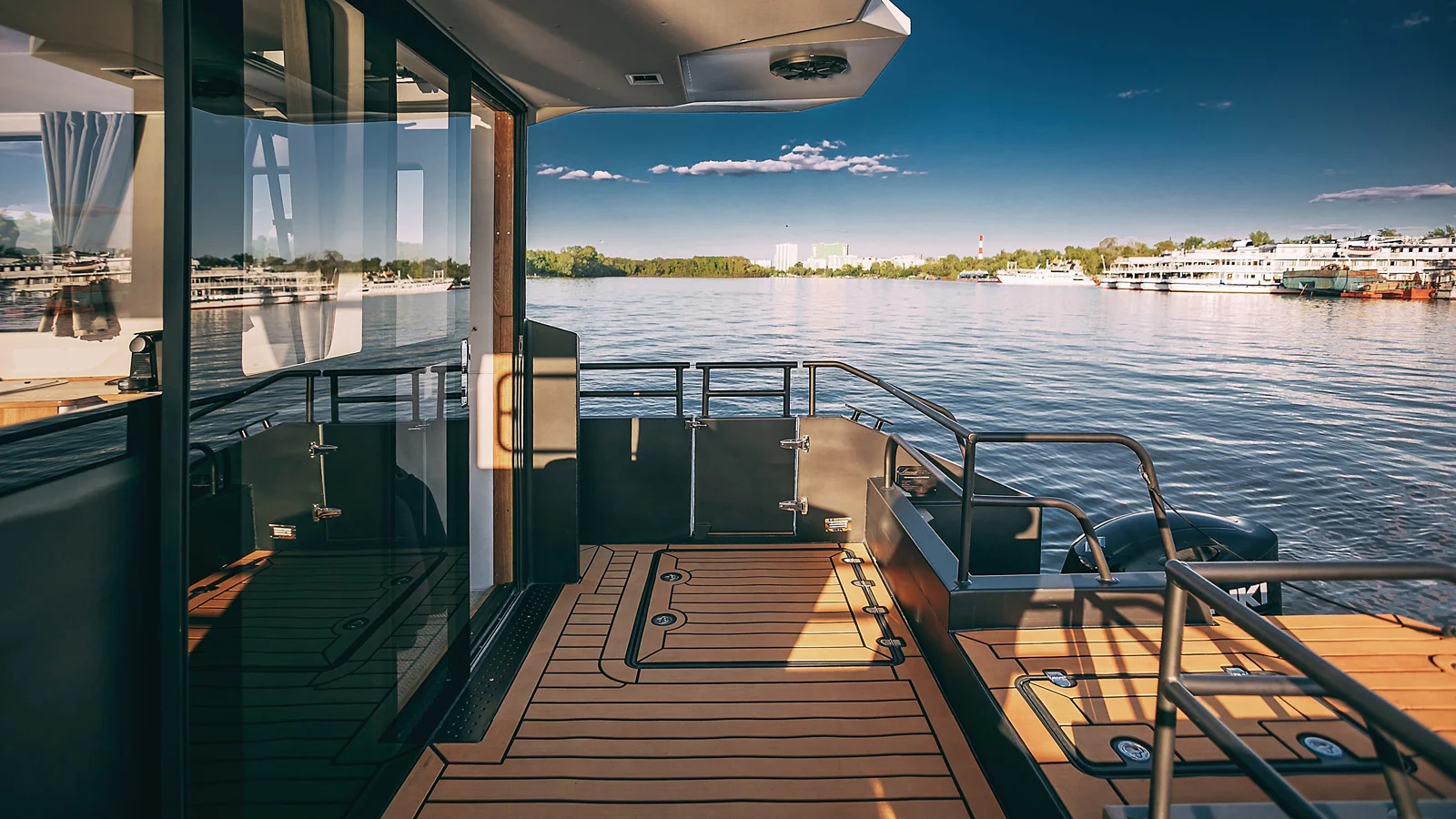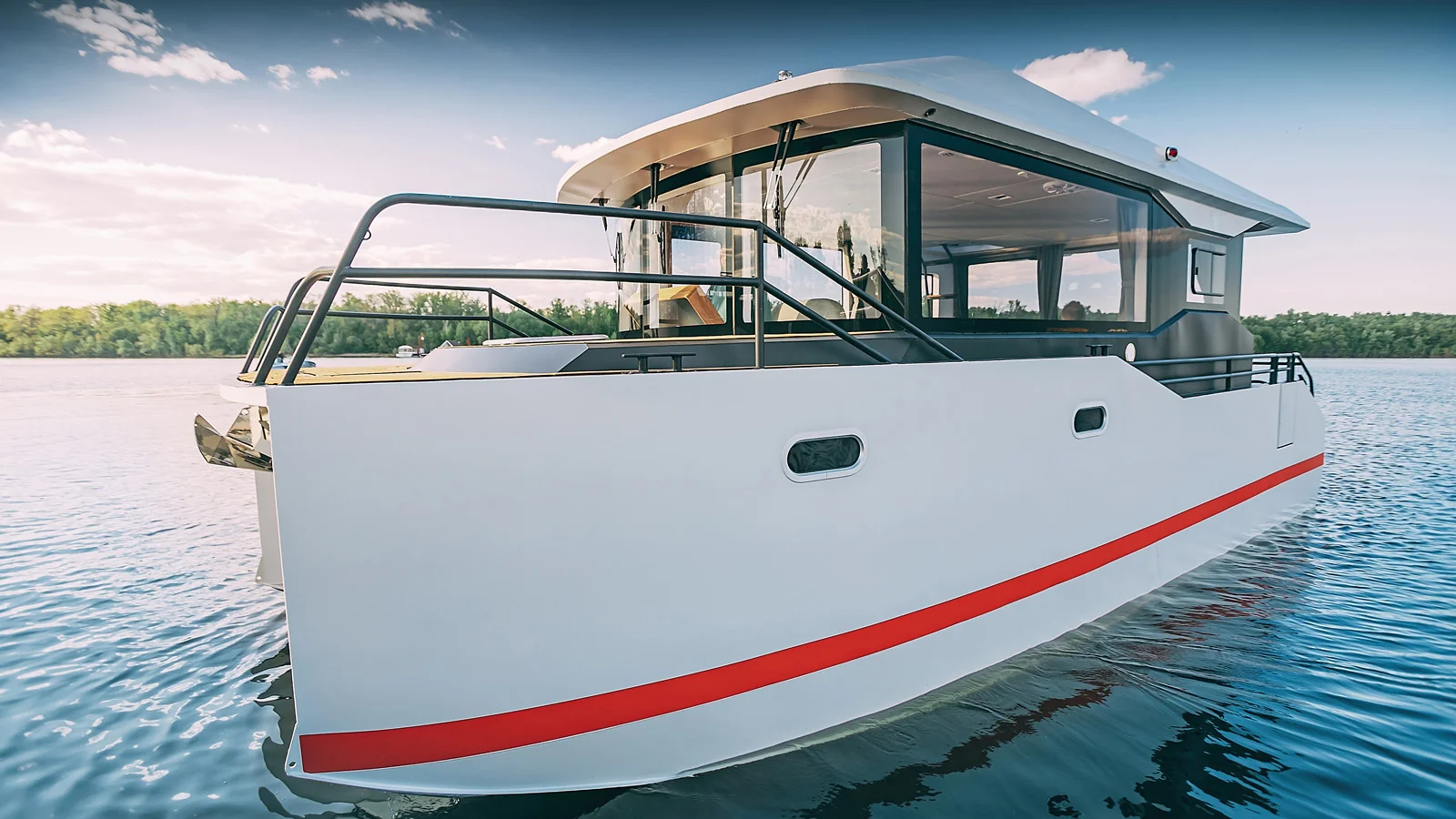Aviator 10К: a catamaran that can fly
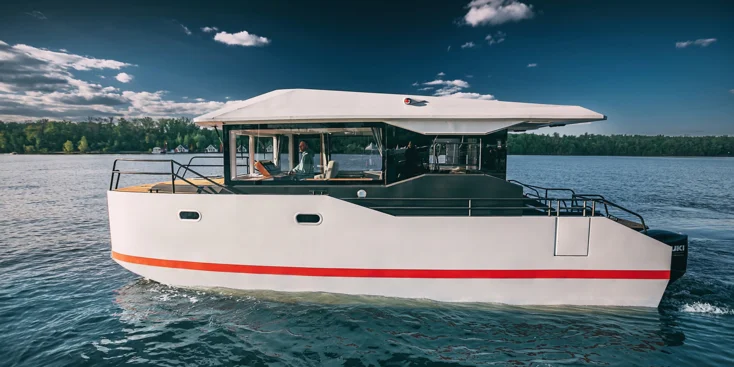
Despite the fact that the first hull of the 9.8-metre 10K catamaran was launched last year, the shipyard was in no hurry with the official debut, taking its time to fine-tune her
Boats have been built in Samara for quite a long time, and some local brands are already quite well-known. But this article is about a shipyard that is trying to go beyond the conventional format. Having studied and analysed the market needs, they want to create and build something fundamentally new. And it is here, at the “Aviator” shipyard, founded just two years ago, that talented constructors teamed up with an experienced broker and created this unusual yacht.
According to Alexander Galkin, the co-owner of the shipyard, when the first hull of the 10K was tested on the water, they “had no mercy and pushed her to the limit” in order to see how the catamaran behaves in different conditions and to simulate the situations that the future owners might face.
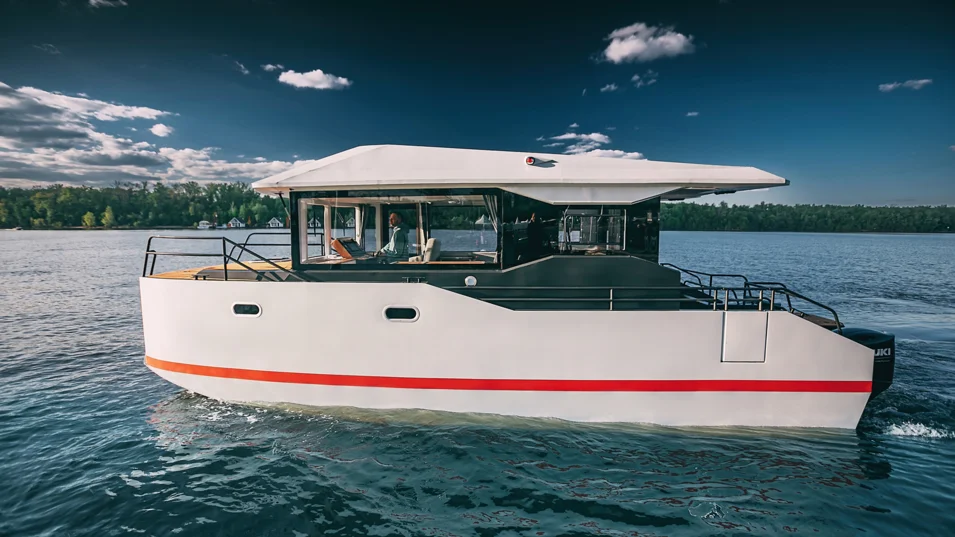
“We thought of building a production model from the start, so a lot of details and solutions had been elaborated beforehand”, said Evgeny Selivanov, General Director of the shipyard. Hydrodynamics, design features, engineering – the first hull had to check their viability in practice and demonstrate the shipyard’s ability to build boats at a high level and to minimize dependence on the suppliers, who are often not reliable.
“We did everything we could do in-house. We’ve even mastered furniture production”, said Alexander Galkin. The catamaran’s exterior, interiors and naval architecture – everything was developed by in-house professionals from the design and engineering bureau, on the basis of which “Aviator” was founded. By the way, the unusual name of the shipyard is related to their previous experience in aircraft engineering, and some aircraft solutions have been implemented in the all-aluminium 10K design, too.
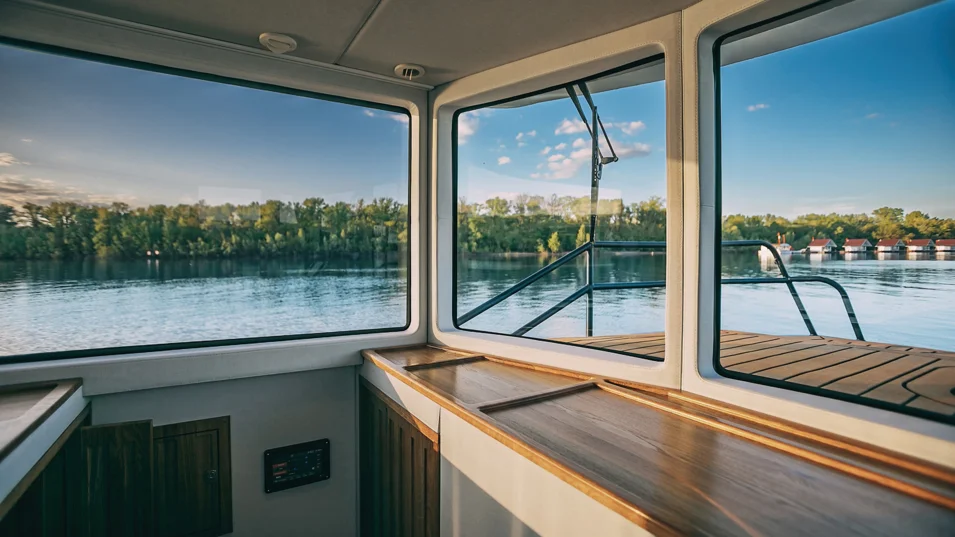
The niche of compact catamarans is free both in Russia and in the world, where just a few American shipyards build something similar. “Aviator” believes that the 10K will be appreciated by divers and all those keen on underwater fishing, water recreation and water tourism, as she offers the volume of spaces typical of larger yachts, as well as stability, small draft and an impressive range. At the same time, she can be used both for fast and long trips.
Exterior
The first hull proved to be nice and well-designed. Despite the dimensions (length of 9.8 m, beam of 3.48 m) the 10K as the founder of a series of compact catamarans looks quite impressive. The light grey colour with orange stripes inspired by the coast guard vessels, the roof lines that seem to have been borrowed from fighter aircrafts, and the plum bow – the fact that it is not a military vessel is revealed only by the panoramic glazing of the superstructure.
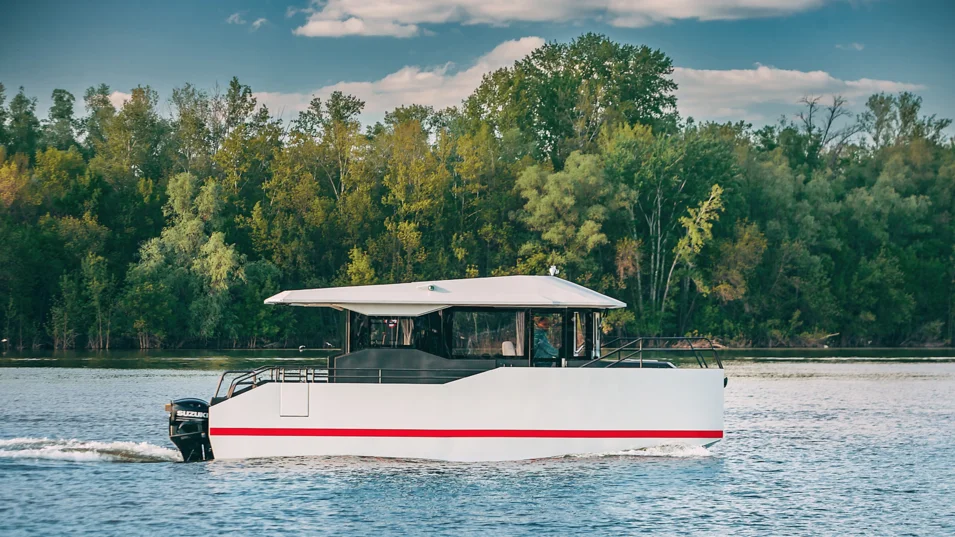
Two convenient doors on both sides provide fast access to the cockpit no matter which side the vessel is moored. The first hull’s cockpit is free, but, if necessary, one can arrange a recreation area here. An interesting feature is a huge aft platform between the hulls with a special space for storing wet gear or garbage and prepared holes, where one can install a removable grille, a ladder or any other equipment. There are similar “ports” at the bow, too.
There is no walkway on the port side, so you can get to the foredeck with brutal high rails only from the starboard side. This asymmetric solution allowed the manufacturer to increase the area of the saloon considerably, which is really important for a compact boat, where every “extra” centimetre of space matters. The foredeck on the first 10K is free, but I suppose one can arrange a little lounge area here at anchor with the help of a couple of pillows form the saloon.
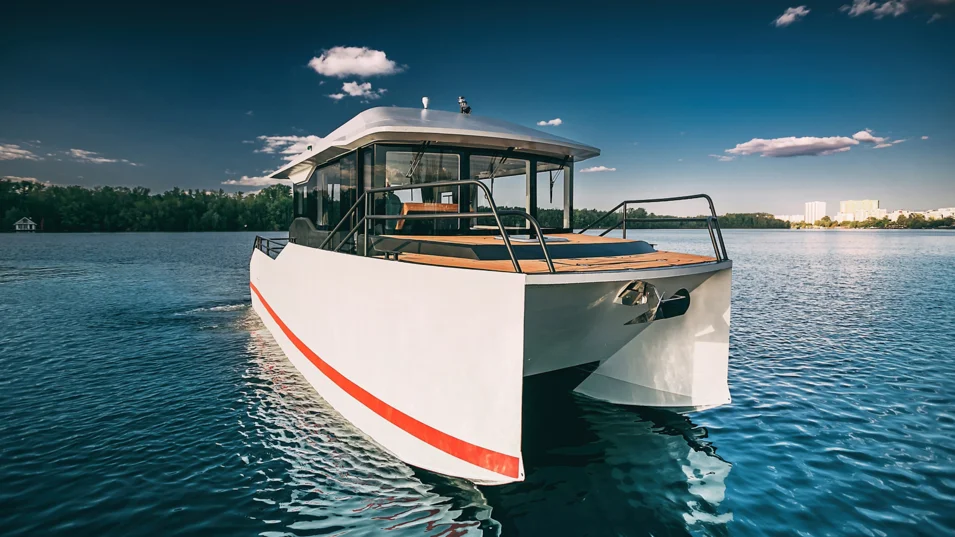
Yet, the upper level of the 10K is a better fit for that – there is a sundeck, which can be turned into a flybridge if you install an optional upper helm station here and a sofa on the portside – a catamaran just like this is currently in build at the shipyard. The control console can be raised when the helm station is being used, allowing one to handle the boat both from a sitting and a standing position, and it can be concealed when it is not in use not to spoil the profile. The first 10K hull features a sundeck, which is partially sheltered at the bow and from the sides, so you can hide here from the wind and curious stares and sunbathe - Eva decking is a kind of synthetic flooring, which is quite comfortable to lie on even when it is not too hot outside.
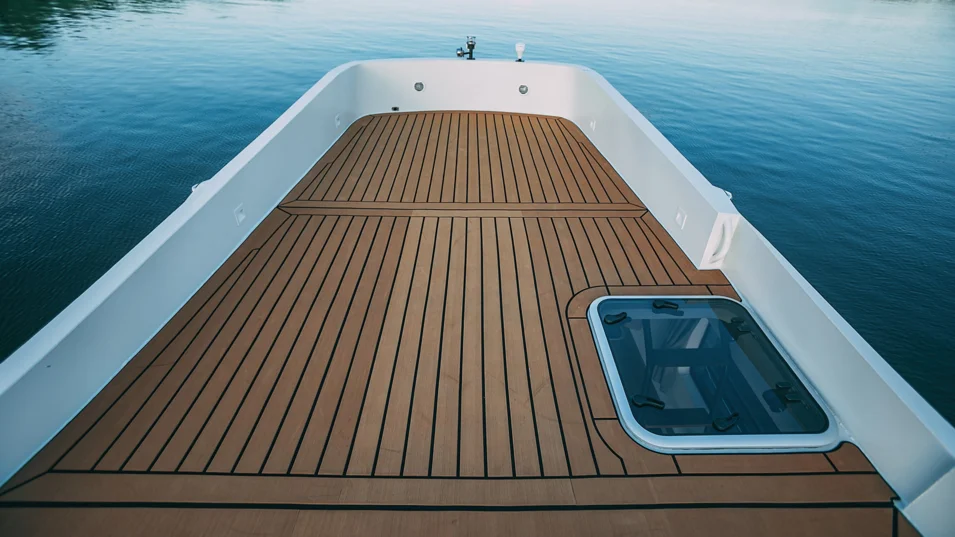
Rather a steep staircase leads you from the saloon to the sundeck, but you can surely go up safely – even with a glass of wine in your hand (as we have checkec it). There is also a less extreme option of a less steep staircase from the cockpit.
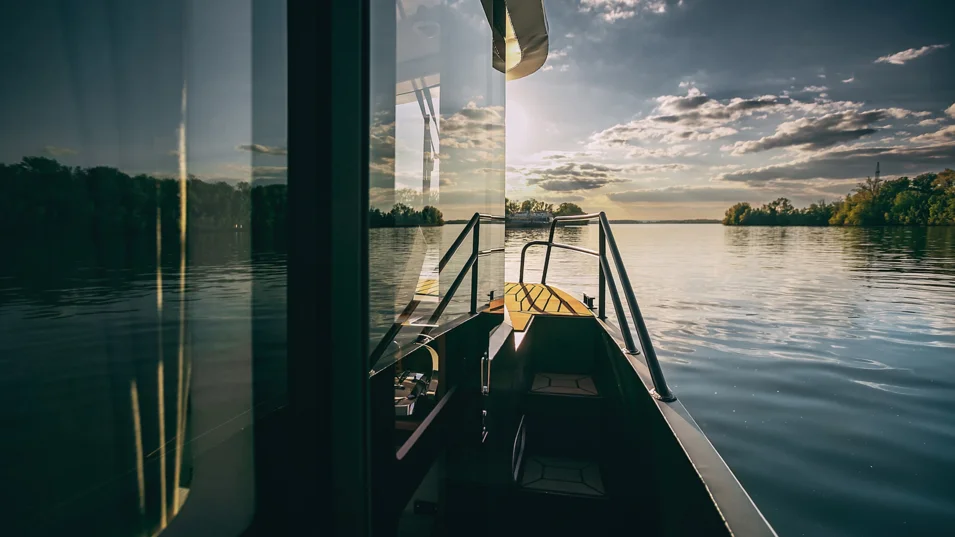
Interior
Inside, the 10k looks a lot friendlier than on the outside. The atmosphere here is not so much of a boat, but of a house decorated in a trendy Scandinavian style with some loft elements of painted aluminium like a stairway to the flybridge or an open rail in the cabin.
Light and dark shades of grey in the interior take turns with glossy oak surfaces of the furniture and table tops: to reduce the weight, the shipyard removed everything “excessive” from every wooden panel. Stylish toggle switches for turning on the light remind one of the aviation background of the shipyard.
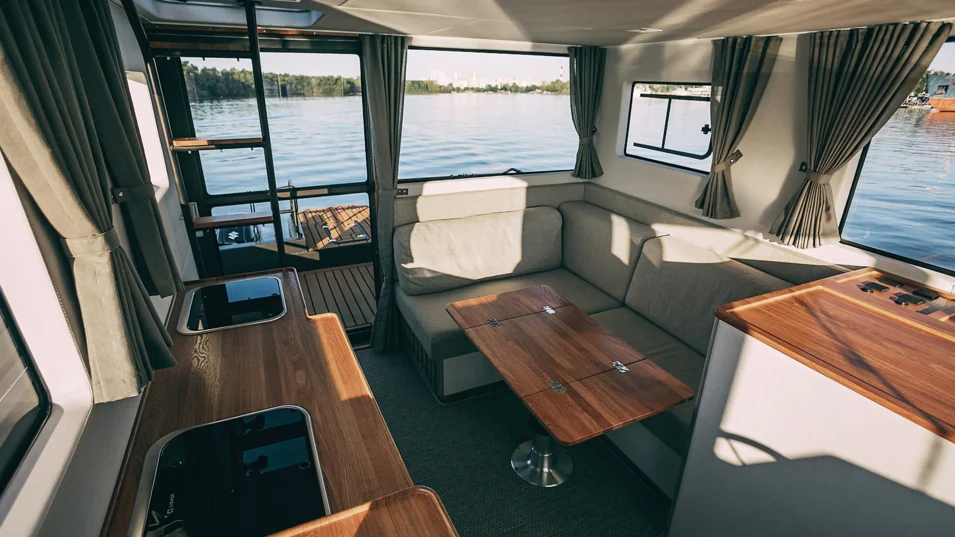
All the interiors are one single space, which, despite the compact size, does not feel cramped and seems a lot larger than it really is. In many ways this feeling is owed to the expansive glazing of the superstructure, particularly the huge window on the portside, which is over 3 metres, high ceilings (about 2 meters) and definitely the asymmetric layout with now side walkway on the portside. And you find it all out only when you step on board - it is not obvious when you just look at the catamaran from the outside.
At the entrance on the portside, there is a large corner sofa with a transformable table. Its size allows one to relax after lunch. If necessary, you can lower the table and turn it into a double bed, bringing the number of beds to four.
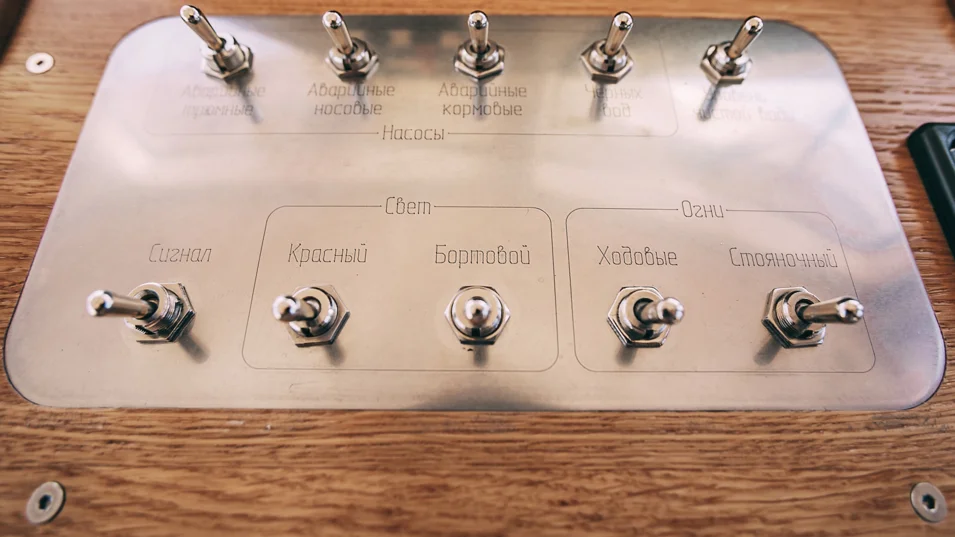
There is a galley with a sink, a work surface, a gas stove and a fridge on the starboard side, and there is a “coffee spot” on the table top and some storage space for small things on the portside. By the way, there is also a drawer under the sofa, which the shipyard offers for storing shoes, as thanks to the heating system the temperature on board is comfortable even in the cold time of the year.
The helm station is equipped like on large yachts. The double seat and the trendy helm allow one to handle it both from a sitting and a standing position, while good visibility is ensured by huge windows. The door on the starboard side allows for quick access to the side walkway, which is convenient when mooring, or to the foredeck or a cockpit.
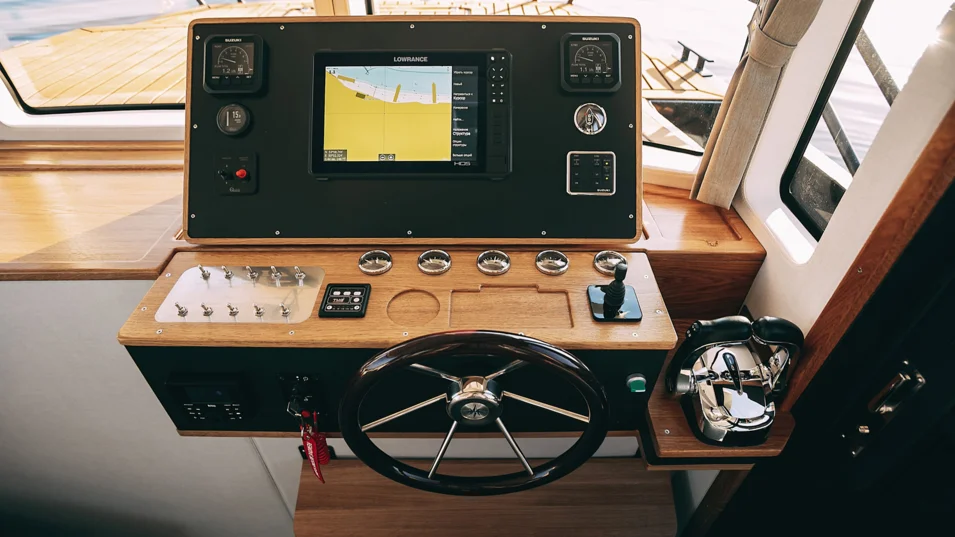
“We’ve thought of everything to make it easy to handle and moor the 10K single-handedly. The entire boat can clearly be seen from the helm station, and the bow thruster makes it so much easier to moor. Besides, the engines that are set so wide apart allow you to moore just with their help without using the thruster or the helm”, said Alexander Galkin.
The control panel features “aviation” style with analog switches and gauges. The first 10K hull features Lowrance HDC-12 chartplotter, but the shipyard is ready to install any other equipment, as there is plenty of space for that.
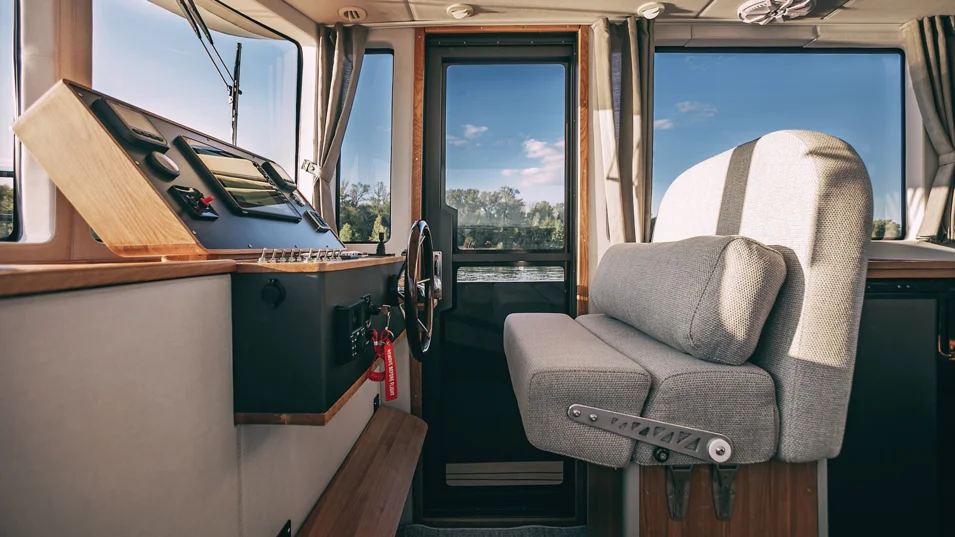
The walkway to the foreward cabin and the head is next to the helm. The full-beam cabin features a decent double bed, but as the height is not large, there is not too much space here. However, it is large enough to stay the night comfortably – particularly with an opening glass hatch and side windows. The idea of an open rail for clothes also seems great: it doesn’t consume space visually, but solves the problem of storing outdoor clothes.
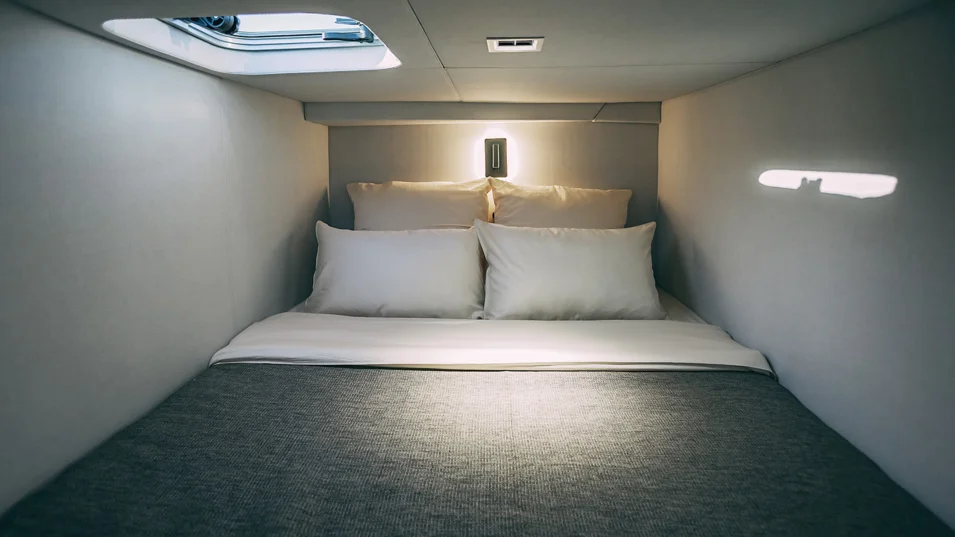
The head with a shower and a small sink is rather compact, but you are unlikely to afford anything like that on a monohull under 10 m.
One should also mention a huge storage space, the access to which opens right behind the transformable sofa, as you remove the pillows and raise part of the frame. Lots of things can be stored here: all kinds of equipment, bulky suitcases, non-perishable supplies – there’s plenty of space here. According to Alexander, even an extra cabin could be arrange here if you add side windows and change the configuration of the sofa in the saloon. To be honest, I think that it is better to keep this space for storing some water toys.
On the water
Despite rather a massive appearance and a weight of over 3.5 tonnes, with two 200 hp Suzuki APX outboards the catamaran reached planing easily. And the transition doesn’t feel on board: you can guess it by the speed of about 20 km/h (10.79 knots). The fuel consumption at a speed of 30 km/h (16.19 knots) was about 34 litres.
Despite the strong side wind and a small wave, the 10K enters all the sharp turns confidently, remains stable and does not succumb to any provocations. The feeling is like she is rolling along the rails. At the helm, you may not feel the drive you get handling a monohull, but it's a catamaran, so the thrill gives way to comfort and stability.
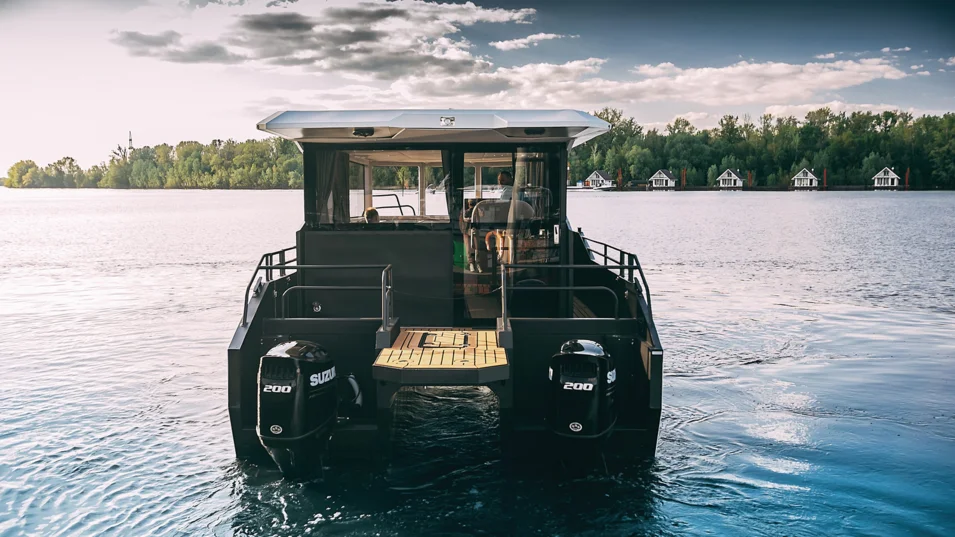
The top speed of about 50 km/h (26.99 knots) with an enclosed saloon and good noise insulation almost doesn’t feel, so you can tell it only by the instruments and views outside the window. If desired, even more cheerful 350 hp engines can be installed, but the shipyard recommends using the 200 hp ones. According to Alexander, he could reach planing even with one engine. We tried doing it during the test, but there were too many people on board.
One can also feel all the charm of the catamaran when mooring: when all the monohull boats around started wild dancing, the 10K remained as laid-back as ever, demonstrating it was all the same to her.
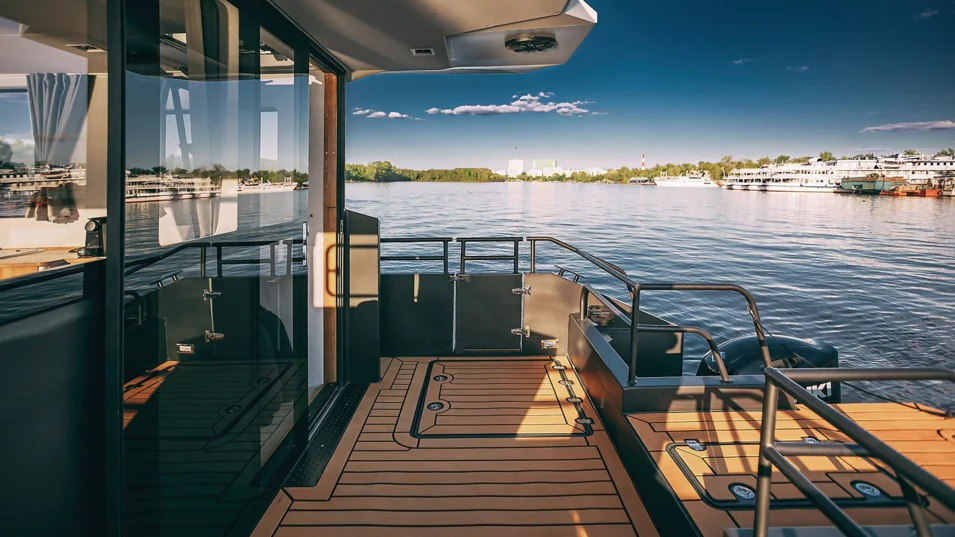
“It was our special goal to ensure that the glasses stood straight and did not fall when moving or accelerating, and the liquid did not spill out of them”, explains Evgeny Selivanov with a smile. Judging by the vase of flowers, the water in which just swayed slightly as we reached the speed of 45 km/h (24,29 knots), “Aviator” had coped with that task really well.
It is no coincidence that the Samara Boat Show was chosen for the official Aviator 10K’s premiere. The whole team could watch their colleagues’ reactions, listen to their reviews, see the visitors’ interest. And based on the number of people who came to see the 10K in just a few days of the show, the debut was a success.
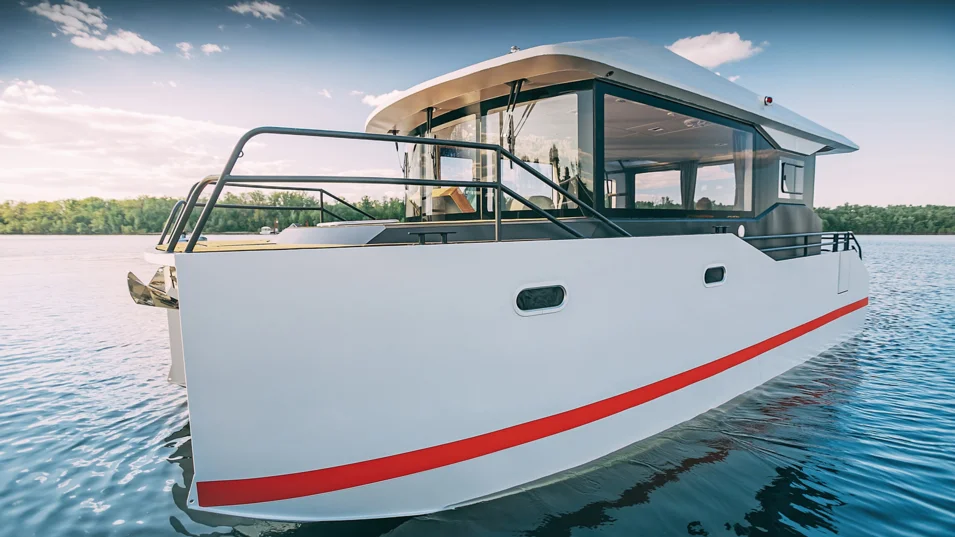
As we have already mentioned above, Alexander Galkin’s previous experience working with the best European shipyards helped a lot in the creation of the Aviator 10K. But one shouldn’t underestimate the contribution and professionalism of the rest of the shipyard’s team either.
“Despite all your knowledge, experience and visual savviness, if you have no engineers who can design and implement it all, it is impossible. The whole team were just glowing with enthusiasm about this project, fighting for each millimetre. And if there was anything we could improve, we did that”, says Alexander.
You have successfully subscribed to our newsletter
